Climate change
Can you convert a climate denier, the first woman president of New York Theological Seminary, the legacy of Jean Vanier, and more in the Weekly Wrap.
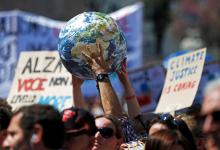
Seemingly every week a new major report comes out sounding the alarm about the escalating crisis of climate change. You may have missed two of these from just this past week that join a drumbeat that often causes me to lose sleep as I worry about the future that my 6- and 8-year-old sons will inherit. First, on Saturday the sensors at the Mauna Loa Observatory in Hawaii indicated that concentrations of the greenhouse gas has reached 415 parts per million (ppm), which means that for every 1 million molecules of gas in the atmosphere, 415 are made up of carbon dioxide. This means that even if we manage to move rapidly toward renewable energy and use other measures to help stanch the steady flow of carbon dioxide into the atmosphere, the next generation will likely be saddled with permanent negative consequences of our artificially elevated levels of CO2. Also last week, the Intergovernmental Science-Policy Platform on Biodiversity and Ecosystem Services (I.P.B.E.S.), a research arm of the United Nations, told the world that we may be on our way to losing as many as a million plant and animal species. The 1,000-plus page report details the effects of climate change on marine and other wildlife and emphasizes like never before the devastating impact of biodiversity loss to humans.
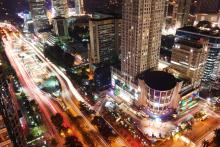
President Joko Widodo of Indonesia is moving forward with a plan to relocate the country’s capital city.
Jakarta, the current capital city, has sunk about 13 feet in the last 30 years.

Inextinguishable Spirit
“Black faith still can’t be washed away” Solange sings in her album When I Get Home. The ambient work pays homage to her Houston roots while exploring themes of blackness and spirituality. Synth, syncopated drums, smooth vocals, and experimental time signatures form a liberating fusion of sound. Saint Records/Columbia
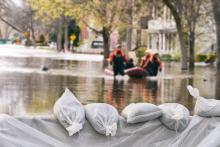
As a Christian, I believe God calls us to a total and radical re-imagination and transformation of our relationship with others and the earth. We yearn for a vision of complete reconciliation for all of God’s created order. As political leaders, especially those of you grounded in faith and values, I implore you to respond faithfully and with full force to love God and neighbor by enacting just, compassionate, and transformative climate policies that rise to the challenge of the climate crisis.

Maybe it was Rev. William Barber’s preaching that touched me with the moral call to climate justice, in partnership with Al Gore, whose organization Climate Reality Project brought this audience together for a three-day training. Later that night, I realized why the message felt personal: Barber pushed me to reframe my conversations with my daughters about climate justice in this country. I teach environmental education at a small college in North Carolina, but the way I communicated at home around the kitchen table needed a transformation.

MAYBE YOU’VE HEARD a land acknowledgement at a conference, sporting event, or worship service. These brief statements name the Indigenous territory on which an event takes place, a small sign of respect to the people who stewarded this land for millennia and whose deep relationship to the land continues today. For any of us who’ve settled on that land, these statements are intentionally unsettling, a way “to counteract the ideologies operating in the Doctrine of Discovery by naming that the land was not empty when Europeans first arrived,” as one group of Canadian churches put it.
But land acknowledgements become trite—an easy checkmark in the social justice box—if they are not part of ongoing relationships with local Indigenous communities. These relationships must include settlers being quiet and listening to some hard truths from Indigenous people about history, responsibility, and reparations.
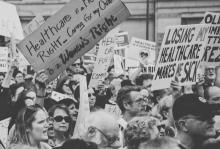
THE LAST TWO years have been extraordinarily difficult for many Christians in the United States who care about social justice and treating the most vulnerable as we would treat Christ himself, given the cruelty of the Trump administration toward the ones that Jesus calls the least of these.
Yet a significant change in our collective imagination is showing signs of emerging out of the 2018 midterm elections and the new public policy debates around health care and climate change, at least in the House of Representatives under new leadership. If realized, this shift could be profoundly important and hopeful for the future of our nation and our planet.
For decades now, we have lacked both the seriousness of purpose and the commitment that we will need to change the status quo on both of these issues, and changing that should be a moral imperative for Christians.
The next few months have the potential to significantly shift the terms of political debate in the United States and even reshape the public’s perception of what our country can achieve on access to affordable health care and efforts to avoid the most catastrophic levels of climate change.

So where can we find hope, and how can we actually move the needle on climate change? By doing three things: One, Americans should follow a moral compass, not a political one. Two, we must focus on bringing change locally. And three, religious leaders should lead the charge by imploring followers — in churches, synagogues, mosques, or temples — to see the moral and theological imperative of protecting all of God’s creation.
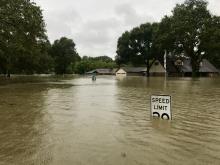
The National Climate Assessment, jointly released by 13 federal agencies in November, affirmed this risk, noting that across all climate risks, “low-income communities, some communities of color, and those experiencing discrimination are disproportionately affected by extreme weather and climate events, partially because they are often excluded in planning processes.”
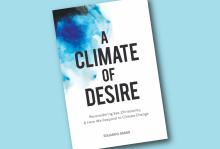
IF YOU’RE LIKE me, your first response to the title of Eduardo Sasso’s book was “What?!” But, as unusual as the pairing of climate change and sex is, Sasso proves that their association is fitting. A Climate of Desire argues that the challenge of today’s climate crisis is ultimately not about technology, science, or political will. Rather, like sex, it’s “about desire: about what we long for and about the consequences of our longings.”
Our longings have always been ripe for co-optation. Sasso’s book shows how, throughout history, from the tower of Babel to the tech frontier of modern California, people have been tempted to forsake their God-given humanity for an artificial substitute. Our problem today, though, is that our refusal to learn from the past comes with an exorbitant price tag. Fossil fuels have enabled the unrestrained indulgence of our misplaced desires, transforming our cities into engines of unprecedented ecological devastation.
In A Climate of Desire, Sasso reminds us that the Spirit-inspired imagination of ancient truth-tellers such as Jeremiah, Ezekiel, and Jesus himself has a great deal to offer us in our current predicament. Calling their contemporaries to repentance, these holy dreamers denounced the harlotry of cities and nations that were running after false gods of wealth and power. They proclaimed visions of the holy that bordered on the psychedelic and grasped that at the heart of injustice and violence is misplaced desire.
Sasso finds tremendous strength in these ancient voices. But he also gains inspiration from recent campaigns for civil rights and contemporary initiatives for ecological renewal, such as the Transition Network and the fossil-free divestment movement.

THERE ARE SEVERAL good and interesting arguments to be had about climate change: Should we tax carbon? How much? Concentrate on electric cars or on public transit? How best to reduce the factory farming that creates so many emissions? Dealing with this crisis will involve the biggest and most rapid transition in economic history, so it would be strange if there weren’t debates about how to proceed.
But one debate not to have is: Is global warming real? By now it’s entirely obvious that the scientists are basically right—that’s why there’s half as much ice in the Arctic as when they started warning us, and half as many coral reefs. Donald Trump aside (there’s a nice thought), this one is so clear even the oil companies don’t dispute it, though of course they try to delay and minimize the need for real change.
Deprived of that point of contention, those who want to disrupt the push for climate action fall back on two particularly dumb straw-man arguments, which are worth engaging just long enough to dispose of.
One is that climate activists want to “turn off fossil fuels tomorrow.” You hear this from oil companies, but you also hear it from liberal politicians who don’t want to take strong action against oil companies. When local environmental justice groups, for instance, asked then-California Gov. Jerry Brown to stop permitting new oil wells next to their schools and homes, he responded with roughly the sensitivity and candor of Oklahoma’s climate-denying Sen. Jim Inhofe. Environmentalists, he said, wanted him to “snap my fingers and eliminate all gasoline in all California gasoline stations.” And if he did that, he said, “What would happen? Revolution? Killings? Shootings?”
1. The Border Wall Fight at the Center of the Government Shutdown, Explained
Steel slats, concrete, walls and fences: here’s what Trump actually wants to build, and what Congress might be willing to pay for.
2. Fashioning a New Congress: What This Freshman Class Wears to Work Matters More Than Ever
“They are unafraid to wear their identities on their sleeves, helping to mark a striking shift in how politicians—and specifically, women in politics—have traditionally been expected to present.”
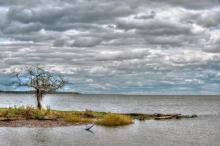
Stormwater pollution is the fastest growing source of pollution in the Chesapeake Bay watershed—a 64,000 square mile drainage basin that sprawls across parts of Virginia, Maryland, Delaware, West Virginia, New York, and Washington, D.C. One of the contributors: religious congregations.

AT THE VERY hour when modern humanity arrived at the pinnacle of triumph—a global marketplace promising riches for all—the skies have been darkened by the terrible specters of ecological crisis and social disruption. This realization dawns just as the urban age has been declared: More than half of humanity now lives in cities.
Surely these occurrences—the urban age and the overlapping crises of our time—are connected. Indeed, any reconciliation with the Earth will doubtless involve a “great resettlement” of our species, through which we, homo urbanis, endeavor to reconcile our urbanity with planetary limits—the epoch of the great suburban dispensation.
Our work defines this challenge by focusing on the suburbs: the sprawling, low-density urban landscape that surrounds large cities, especially in the “new world” of North America, Australia, and New Zealand.

The United Nations climate negotiations in Katowice, Poland — the follow-up to the blockbuster 2015 Paris conference — came to a dramatic close on Dec. 15 with the adoption of the "Katowice Climate Package." The package represents significant progress on global climate action and will allow nations to move forward in setting and meeting greenhouse gas emissions reduction targets over the next five years. However, the roadmap will need major improvements to reach the level of “ambition” the scientific community says is needed to protect the most vulnerable.
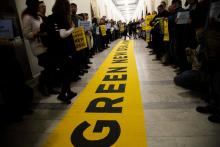
More than 1,000 young adults risked arrest Monday in Washington, D.C. by flooding the offices of Minority Leader Nancy Pelosi (D-Calif.), Rep. Steny Hoyer (D-Md.), and Rep. Jim McGovern (D-Mass.). It’s the second time this winter that the Sunrise Movement has taken to the capitol in what Sunrise Movement co-founder Varshini Prakash referred to as part of a concentrated effort, “[to] build policy support and people power” around a Green New Deal.
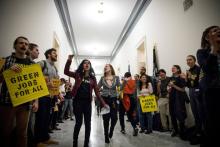
A recent U.S. climate assessment made headlines last week for its conclusion that the victims of climate change are no longer some future generation, but us — and we’re feeling the effects now.
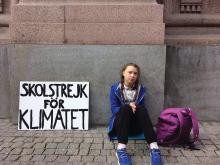
LEADERSHIP COMES from unlikely places—Christians know that better, perhaps, than anyone else. So as we face the savage crisis of climate change, a crisis made far worse by our inaction, it is very good news that a 15-year-old autistic Swedish girl has shown the rest of us new directions in this battle.
When school began in the fall, Greta Thunberg decided not to go. Inspired in part by the Parkland students and their school walkouts over gun violence, she sat down on the steps of the Swedish parliament in Stockholm every morning and stayed there the entire school day. Every day. Her argument, at its core, was that if the country’s politicians couldn’t be bothered to fix climate change, there was no real reason for her to be studying, since the world she would inherit would be so fatally compromised.
Her protest drew widespread attention in Sweden, in part because her father is a well-known actor and her mother a famous opera singer (albeit one who has given up her international performing career, persuaded by her daughter that flying to concerts was a waste of carbon). Others noticed too. She came to Finland this fall to address the largest climate rally in Helsinki history, and then to London for the launch of a civil disobedience movement called Extinction Rebellion.
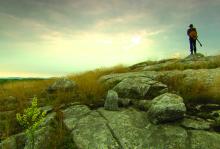
IN OCTOBER, The New York Times published an article that, despite its dire implications, seemed to wash away in the rapid news cycle. It described how, according to the U.N.’s Intergovernmental Panel on Climate Change, the world’s population will see major consequences, as early as 2040, from its mistreatment of the planet. More droughts, more wildfires, more poverty, and higher temperatures—in only 22 years. When that time comes, when nature begins to resemble Hell, how will we have to live?
Emmy-nominated documentary filmmaker David Conover has been thinking about this question for 12 years. “I was a parent of two young kids,” Conover told me about the moment when he began to ruminate on creation care, “and was trying to understand the world they were growing into: pollution, severe weather with fires, flooding, droughts, struggles with realities that weren’t that apparent even a generation ago.
“There have been many films made about those things, how we know that they’re happening, what’s causing them, and so on. But there haven’t been any films about people and their experience of exploring the very tough question of how to live right today in this climate.”
Conover’s wrestling with how to live a moral life during a time of environmental hardship has culminated in the production and release of his newest documentary, Behold the Earth, which explores contemporary Christianity’s relationship with creation care.